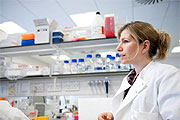Source: University of Glasgow
Notable People
Archibald Barr
-
Archibald Barr, 1891

-
Archibald Barr's matriculation record - detail from page, 1874

Source: University of Glasgow
-
Archibald Barr's matriculation record - full page, 1874

Source: University of Glasgow
-
Barr and Stroud and other rangefinders being tested by Austro-Hungarian soldiers, 1911

Source: University of Glasgow
-
Barr & Stroud's fitting shop, 1913

Source: University of Glasgow
-
Archibald Barr, (seated, second right) and his staff at Anniesland c1920

Source: University of Glasgow
Engineer and Rangefinder Manufacturer
Born 18 November 1855, Glenfield, Scotland.
Died 5 August 1931.
A world leading inventor and businessman.
Connection to the University of Glasgow: Graduate, Honorary Graduate, Professor
GU Degrees: BSc, 1878; DSc, 1890; LLD, 1914;
Discover more engineers on the University of Glasgow Story website
Achievements
The following achievement is associated with Archibald Barr:
Inventing the range-finder and other optical instruments
The inventions of Archibald Barr and their subsequent commercial exploitation have had a lasting impact on the world economy.
Honours
The following honours are associated with this person:
Biography
Archibald Barr (1855-1931) was a graduate of the University who was Regius Professor of Civil Engineering and Mechanics, 1889 to 1912. He was awarded an honorary LLD in 1914.
Born near Paisley, Barr studied at the University and graduated BSc in 1878 and DSc in 1890. In 1876 he became Young Assistant to the Regius Professor of Civil Engineering and Mechanics, James Thomson, and in 1884 he was appointed Professor of Civil and Mechanical Engineering at the Yorkshire College of Science, later the University of Leeds.
Barr returned to Glasgow in 1889 to take the Regius Chair. He had already formed a design consultancy business with William Stroud, the Professor of Physics in Leeds, and the two men formed a successful company, Barr & Stroud, designing and later manufacturing rangefinders and other optical equipment for military and naval use. Barr became the senior partner and the head of the design team at the firm's Anniesland factory, and in 1912 he resigned his chair to focus on the firm's development.
During his period at the University, the number of students studying Engineering rose from thirty-nine to more than 200. He raised £40,000 from local industrialists and charitable bodies to build Glasgow's James Watt Engineering Building in 1901, and he persuaded companies to donate most of the £14,000 required for the purchase of the scientific equipment installed in its laboratories. He was influential in organising the new Faculty of Science in 1893 and successfully campaigned for a lectureship in Electrical Engineering, which was established in 1898.

